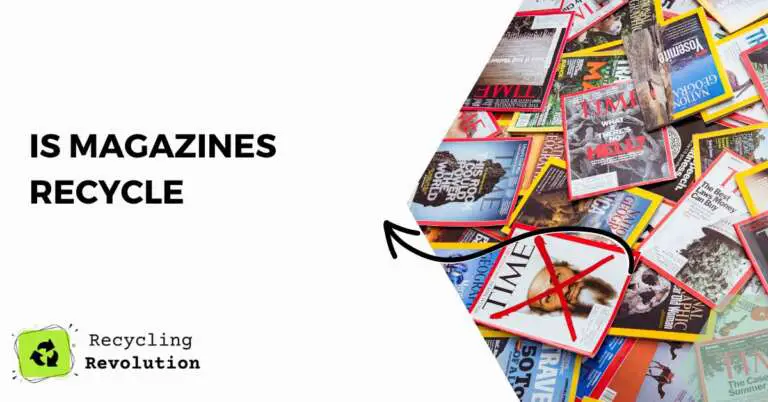If you’ve ever found yourself asking, “Can magazines be recycled?” then you’re in the right place. In our increasingly eco-conscious world, knowing how to dispose of various materials responsibly is critical.
Magazines, with their glossy covers and vibrant pages, can seem perplexing. Are they recyclable, or do they belong in the trash?
TL;DR: Yes, magazines can be recycled. They are made from paper which is a recyclable material. The gloss on the paper does not affect the recyclability of the product. Always check with your local recycling service to ensure they accept magazines.
Understanding Magazine Composition
When it comes to recycling, the key to understanding what’s possible starts with understanding what we’re working with.
Magazines are primarily made from paper, specifically wood pulp, which is recyclable. This pulp is then coated with a shiny finish to give it the glossy appearance that many magazines have.
But don’t be fooled by that shiny exterior – it doesn’t affect the recyclability of the product. The glossy finish of magazines does not hinder their recyclability.
How to Recycle Magazines: Step by Step
Recycling magazines is a straightforward process. Here’s a step-by-step guide:
- Collect Your Magazines: Gather all the magazines you want to recycle. This can include old subscriptions, catalogs, and any other type of glossy paper product.
- Find Your Local Recycling Service: Check with your local recycling service to make sure they accept magazines. While most do, it’s always better to be sure.
- Prepare for Recycling: If necessary, remove any plastic packaging or non-recyclable inserts from the magazines.
- Recycle: Place your magazines in the appropriate recycling bin.
Alternative Ways to Recycle Magazines
While placing your old magazines in the recycling bin is a great option, it’s not the only one. There are some creative ways to repurpose old magazines and give them a second life.
- Crafts: Magazines can be used to create colorful collages, origami, and a variety of other crafts. This can be a fun activity for children or adults.
- Donate: Schools, art centers, and libraries might be interested in your old magazines. Check with local institutions to see if they accept magazine donations.
- Sell: Certain vintage or specialty magazines might have value. Consider selling them online or at a local antique shop.
- Swap: Organize a magazine swap with friends, family, or neighbors. This is a fun way to share interests and recycle at the same time.
Additional Considerations in Magazine Recycling
Let’s dive deeper into the topic of magazine recycling. It’s not just about whether or not you can recycle magazines, but how doing so in the right way can contribute to the overall health of our planet.
This segment expands on additional factors that can impact magazine recycling and offers other creative ways to make the most out of your used magazines.
Does Recycling Service Matter?
Indeed it does. The facilities and capabilities of recycling services can vary by location, and I recommend checking with your local service to understand their specific guidelines.
Even though magazines are universally recyclable, some smaller or rural services may not have the infrastructure to process glossy paper, while larger or urban services likely will.
What About the Ink?
A common question revolves around the ink used in magazines. The good news is that the de-inking process in recycling plants has become highly efficient, and the inks used in magazines do not pose a problem for the majority of recycling facilities. Thus, ink in magazines does not affect their recyclability.
Are there exceptions?
While magazines are generally recyclable, there are exceptions to the rule. For instance, magazines that have plastic coatings rather than traditional paper gloss cannot be recycled.
Similarly, if a magazine includes a lot of non-paper extras like stickers, magnets, or plastic toys, these components should be removed before recycling.
Creative Reuse of Magazines
Here are some additional creative ways to repurpose your old magazines.
Decoupage: Decoupage involves cutting out images or shapes from materials like magazines and gluing them onto an object. Once dried, the object is coated with layers of varnish to protect and finish the design. This technique can be used to transform furniture, storage boxes, and more.
Beading: Strips from colorful magazine pages can be rolled tightly and sealed to make beads. These can be strung into necklaces, bracelets, or used in other craft projects.
Bookmarks: Cut out images or interesting quotes from magazines to create your own unique bookmarks.
Picture Frames: Use strips of magazines to make colorful, DIY picture frames.
Scrapbooking: Magazines are a goldmine of images and words for scrapbooking enthusiasts.
Reducing Magazine Waste
To further your green efforts, I recommend considering ways to reduce magazine waste in the first place. This could involve:
- Switching to digital subscriptions: Many publishers offer online versions of their magazines. This not only cuts down on paper waste but also allows you to carry your favorite reads with you wherever you go.
- Sharing Subscriptions: If digital versions aren’t for you, consider sharing a subscription with a friend or family member. This way, you both get to enjoy the content while halving the environmental impact.
- Opting for Less Frequent Deliveries: Some publications allow subscribers to choose how often they receive issues. Opting for less frequent deliveries can result in fewer magazines to dispose of over time.
While recycling is a critical piece of the environmental puzzle, it’s just as crucial to think about how we can prevent waste in the first place. By being mindful of our consumption and disposal of items like magazines, we can all contribute to a healthier and happier planet.
The Importance of Recycling
I recommend recycling as an important step toward preserving our environment. When we recycle, we reduce the demand for new raw materials. This can help save forests, reduce energy usage, and lessen pollution.
Note: Recycling also reduces the amount of waste that ends up in our landfills and oceans. With the global waste problem growing, every little bit helps.
Conclusion
Magazine recycling is not only possible, it’s also easy and beneficial to our planet. By taking a few simple steps, we can divert waste from landfills, provide raw materials for new products, and even find creative ways to repurpose our old reading materials.
Whether you choose to toss your magazines into the recycle bin or donate them to a local school, every effort contributes to a greener world.
FAQ
Can all magazines be recycled?
Yes, all magazines can be recycled. However, it’s always best to check with your local recycling service to make sure they accept magazines.
Does the glossy finish on magazines affect their recyclability?
No, the glossy finish on magazines does not affect their recyclability.
What can I do with old magazines besides recycling?
Old magazines can be used for crafts, donated to schools or libraries, sold if they’re vintage or specialty editions, or swapped with friends and family.
Why is it important to recycle magazines?
Recycling magazines helps reduce the demand for new raw materials, which can save forests, reduce energy usage, and lessen pollution. It also reduces the amount of waste that ends up in our landfills and oceans.

